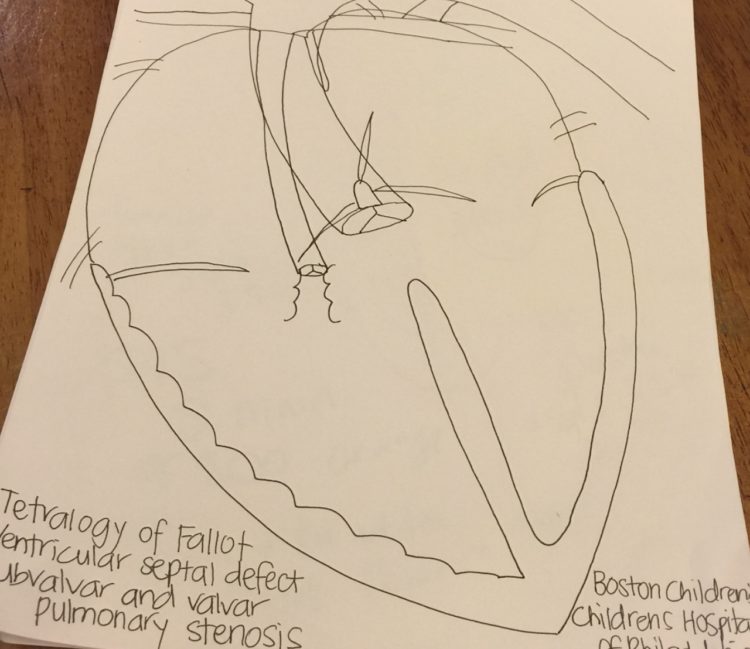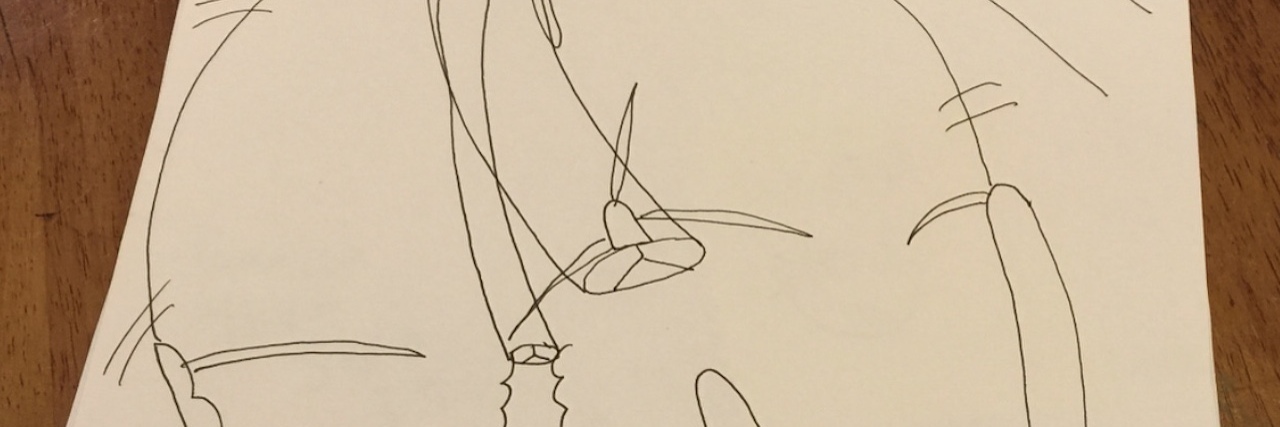9 Helpful Questions to Ask When Your Baby Is Diagnosed With a Congenital Heart Disease
My 11-month-old daughter was diagnosed in utero with the congenital heart disease (CHD), Tetralogy of Fallot (TOF). I never heard those three words – congenital heart disease – before that day in July 2017, but they have since forever changed the trajectory of my life.
Prior to her diagnosis, I had been monitored very closely by a perinatologist. My pregnancy was considered high-risk because I was 36, and I had also given birth to premature twins. The first few growth scans showed some abnormalities, but it was hard to pinpoint the exact cause. Instead, my perinatologist told me my baby was likely going to have some type of dwarfism, because her limbs were consistently measuring behind the normal range. I kept wondering to myself, “Why is she so small?” I was eating right and taking care of myself. Maybe it was because petite frames run in my family? The questions swirling around my mind were endless. I was trying to get a handle on researching and finding a specialist in the field of dwarfism, when at my 20-week scan my baby’s actual diagnosis presented itself. I had been in that office and laid on that table, week after agonizing week as my doctor scanned my baby’s anatomy over and over again. But that day he finally found it, “It’s your baby’s heart. Something is not right.”
Everything changed for me that day. Overnight, I had to become somewhat of an expert on my baby’s CHD and the physiology of her heart. I have asked a tremendous amount of questions to countless doctors along the way, and I know I’ll always continue asking more. To this day, a lot of people say to me, “You’re lucky you found out before she was born.” While there is some truth to that statement, I don’t think there’s anything “lucky” about having a child born battling a critical heart disease. Although I still feel the diagnosis stole so much from my baby, and from us as her parents, I do feel lucky that it also drilled home that old motto, “Knowledge is power.”
Here are a few things you might want to ask your doctor (s) about your baby’s CHD.
1. Select your doctors and ask them to draw a diagram.
My husband and I immediately started doing research on TOF and CHD and we asked our perinatologist for referrals to CHD specialists. We chose three hospitals that housed pediatric cardiology specialists, made appointments for consultations and drove hundreds of miles over a one-month period to get the answers and advice we desperately needed. While interviewing the doctors and surgeons, there was one thing they all did: drew us a diagram of our baby’s heart explaining her CHD. I still have the diagrams. I have screen shots of them on my phone, and the actual paper copies are stored in a safe place. I look at them every single day. I have found these hand-drawn diagrams to not only be beneficial for me, but also very helpful when I am trying to explain my baby’s heart disease to my family and friends.

2. Find out if the CHD is critical.
I don’t suggest asking this for the sake of comparing your baby’s CHD with that of another child, but instead to get prepared for what to expect. In my daughter’s case, her CHD was critical. She had to be started on prostaglandin moments after her birth to increase her oxygen levels. A few days after she was born, she underwent her first open-heart surgery. At 11 months old, she has underwent heart surgery more times than most adults and there are more in the near future. I knew all of this was going to happen months before she was born and it gave me time to process and plan for it all.
Some CHD babies do not require medical interventions until later in life. Either way, I strongly believe in having a roadmap of what to expect and prepare for.
3. Can you recommend a pediatric cardiologist?
I consider my baby’s pediatric cardiologist her “primary care doctor.” She knows my daughter’s heart inside and out. We visit her cardiologist every three weeks for echocardiograms, and we sit and talk at length after each one about her prognosis. Since my first consult with her cardiologist when I was 24-weeks pregnant, she has been the liaison between me and my daughter’s surgeons who happened to be located in another county. My baby’s cardiologist has been my biggest source of hope and strength since the diagnosis, and I feel so blessed that we found her. I was led to her by the perinatologist, who I asked to help me decide who would be the best to care for my baby. A pediatric cardiologist you feel confident in and comfortable with can be your guiding light through the CHD journey.
4. Does the delivery hospital have a neonatal intensive care unit (NICU) and/or cardiac intensive care unit (CICU)?
I feel very fortunate to live in Los Angeles, where top-notch pediatric care has been readily accessible for my daughter every step of the way. I know this is not always the case depending on where you live, but I highly recommend finding a hospital that has a CICU, or a NICU where the nurses and doctors are trained in treating babies with CHDs.
5. Ask your OB/GYN to deliver your baby.
I grew very close to my OB/GYN while discussing my baby’s CHD and my preferred birth plan. At just about every visit I made sure to tell him that I only wanted him to deliver my baby. I knew scheduling and other factors go into play when a mom goes into labor and her obstetrician is unavailable. Sure enough, when I went into labor prior to my scheduled C-section date, my doctor was “off.” I remember trembling as we arrived to the hospital. I was so nervous that the on-call doctor wouldn’t know what to do with my TOF baby. I cried to the nurse, and pleaded with her over and over to please call my doctor. She explained it was against hospital policy. I explained to her in detail my birth plan, my baby’s CHD diagnosis and the bond I created with my doctor. “He wants to deliver my baby, he would want you to call for him. Trust me. Please.” The nurse finally took it upon herself to do me the life-changing favor of calling my doctor, and within an hour he arrived at the hospital. I remember him telling me he was so glad I had the nurse call for him. Seeing my doctor’s face made me feel so much more comfortable as I anxiously gave birth to my heart baby.
6. What type of impact will CHD have on my baby?
I have found my baby’s prognosis to be difficult, mostly because it seems to change often. I was told overall my daughter would grow up and live a fairly normal life. But her heart will need a lot of maintenance, surgeries, procedures, lifelong medications… I am still learning to be OK with all of it. Most parents feel crushed just watching their baby have the common cold or fever, yet here CHD parents are handing their babies over to surgeons far too many heartbreaking times. It’s unfair, but it’s life. For me, it’s a bitter pill to swallow. The first time I heard the prognosis, I was asked if I still planned to carry my baby to term. I remember my eyes immediately welling up with tears because no one had ever asked me if I considered terminating my pregnancy. I know the doctor wasn’t trying to be insensitive, but instead providing me with all of my options. For me, my baby’s CHD did not change the fact that she was mine and I wanted to take care of her with or without her CHD.
7. Ask other heart moms for advice and support.
I have found a huge community of heart moms and dads via a variety of social media communities, and I am so grateful to have them so accessible. Whenever I need support, prayers, information or to hear someone else’s experience with their baby’s CHD, my online communities are who I turn to first. A quick Facebook search of “Heart moms,” or “CHD” pulls up lots of helpful communities I highly suggest.
8. Ask your preferred pediatrician if he/she is comfortable having a patient with a CHD.
I already had a pediatrician because I have 4-year-old twin boys. Naturally, I planned to take my new baby to her. After sharing my baby’s diagnosis, I sat and consulted with my pediatrician to make sure she was comfortable with having a patient with a CHD. Fortunately for us, she was willing to accept my daughter. She did let me know up front that she never had a patient with a CHD, but I trusted her enough to know she would take great care of my baby’s general pediatric needs while consulting with her cardiologist when needed.
9. Ask any question you can think of, then ask it again.
The life of a heart parent is hard to navigate. You have to learn a lot of complex information, fast. I was overwhelmed — heck I still am — because a lot of things are hard to comprehend. So I learned to ask questions, even the ones I thought were “silly.” I never let myself be intimidated by the doctors or the nurses, or feel insecure at my lack of medical terminology. I always remind myself I am my daughter’s best advocate and I need to know everything about her CHD.
Never stop yourself from asking the questions that keep popping into your head and that weigh heavy on your heart. And if you are anything like me, allow yourself to ask the questions again when you need clarification to make sure you understand.
#QuestionsForDoctors
Photo credit: Nisha Gutierrez-Jaime

